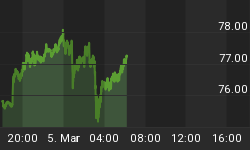According to Alan Greenspan the recession is over. What can one say? Greenspan jettisoned his economic bearings years ago and now the "Guru" who failed to predict the current recession is hailing a recovery that is looking more and more like a phantom with each passing day. In the meantime unemployment mounts and the dollar continues to slide. Now this is where it gets interesting. Many commentators are telling us that deflation has arrived while a depreciating dollar is warning of inflation. Which is it? Without a doubt, it's the latter. These people have overlooked the fact that a deflation requires a monetary contraction.
The problem is that people who should know better are confusing price adjustments with a contractionary policy. If they were right the dollar would be appreciating in anticipation of a rise in domestic purchasing power. What we are seeing is that the markets are distinguishing between the short term and the long term, which is exactly what Bernanke expected. He's a Keynesian but he's not an idiot.
We are told that the upside to a depreciation will be an increase in the demand for American exports which will stimulate US manufacturing. But a continuing depreciation implies an inflation rate in excess of America's trading partners. This is a calculated destruction of the currency and a policy for impoverishment, not economic growth. A depreciation leads to the rearrangement of capital goods: it cannot increase their quantity. And growth is just another term for the process of capital accumulation. Under these circumstances Americans would have to accept falling living standards. Now I want to stress that this will only happen if the depreciation is relentless and the process of expanding the capital structure ceases.
Naturally, as the dollar falls foreign purchases of American assets will grow. This is already happening as foreigners pour in money to buy up US shares and property. Despite the fact that this assets sell-off is monetary-induced expect unions to start squealing about free trade leading to the farm being sold and that what is needed to prevent this treason is greater government intervention, something the Obama administration has made clear it is only too willing to provide. What it isn't providing are sound economic policies.
Obama and his crew not only set their faces against tax cuts they are preparing launch a flood of new taxes in the near future. According to these brilliant economic historians and dazzling economic theorists tax cuts have never worked and never will. Moreover, raising wages rates above the value of the worker's product never causes unemployment. This is why they raised the minimum wage last July. The result, teen unemployment rocketed in August and September. And yet the Obama administration is considering a $3,000 tax credit business for every extra worker a firm takes on.
Hang on a minute. If excessive wage rate do not cause unemployment then why the tax credit? What's missing here is not only consistency but the failure to recognise that for the credit to work it would have to be permanent, or remain until by one means or another wages rates were aligned with the value of the worker's output. There is the additional problem that at the moment much of the unemployment is of a restructuring nature. The boom created malinvestments which are still being liquidated. This adjustment process makes unemployment unavoidable. As a rule the duration of this type of unemployment is comparatively short. Whether it becomes intractable depends on Obama. Right now the situation is not looking good. He is making it very clear that in his ideology big government is always the solution and never the problem.
There appears nothing in his character or intellectual make-up that suggests he is capable of a change of mind. The result is that the banks borrow from the Fed at what amounts to a zero rate of interest. They then lend to the government at something like 4 per cent so that it can spend more and more. (The Democrats have put another spending binge on the table). What the banks are not doing is lending to business. Now this is not as straightforward as it appears, even though the lending process is genuinely absurd from an economic angle.
The self-evident effect of this borrowing is to allow the administration to increase its spending. In doing so it competes with business. As it continues to raise its spending it exerts an ever increasing downward pressure on the country's production structure which in turn will put further pressure on living standards. In doing so it also will squeeze more and more companies, particularly small ones. (If I was a conspiracy-minded person -- which I am not -- I would be tempted to call this "a revolution from the top" to put the US into a statist straitjacket). In other words, business will find itself competing for a diminishing pool of capital. I doubt if this was the kind of "change" Americans were expecting.
Assuming that Obama adheres to his present course then there is every possibility that the monetary dam that Bernanke constructed will eventually flood the banking system and generate surging inflation, sending the dollar into free fall and leaving Americans struggling with stagflation.
As a last resort, the Democrats and their media stooges can always blame Bush -- again.















